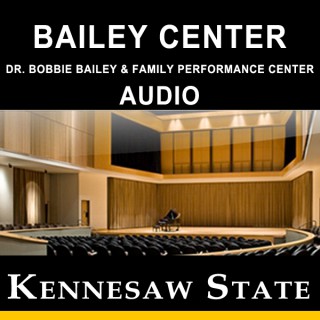
Year of Arabian Peninsula (2014-2015)
Follow Year of Arabian Peninsula (2014-2015)Kennesaw State University will be celebrating the Arabian Peninsula during the 2014-2015 academic year. The university will host a series of events, lectures, conferences, and other activities throughout the year designed to promote a deeper appreciation for and understanding of the Arabian Peninsul…
- Sep 15, 2015 LATEST EPISODE
- infrequent NEW EPISODES
- 1h 10m AVG DURATION
- 23 EPISODES
More podcasts from Kennesaw State University
Latest episodes from Year of Arabian Peninsula (2014-2015)

Kennesaw State University examined the Arabian Peninsula during the 2014-2015 academic year. The university hosted a series of events, lectures, conferences, and other activities throughout the year designed to promote a deeper appreciation for and understanding of the Arabian Peninsula. Comprised of seven countries - Bahrain, Kuwait, Oman, Qatar, Saudi Arabia, United Arab Emirates, and Yemen - the Arabian Peninsula is a diverse region, with each country possessing a unique history, economy, political structure, and culture. Arabia is one of the oldest continuously inhabited places in the world and is the birthplace of Islam. It is also where open-water sailing and global trade first began. It is this rich history of continuous global trade and relations that makes the Arabian Peninsula such a perfect choice to be the focus of KSU’s renowned “Year Of” program. http://dga.kennesaw.edu/yearof/arabianpeninsula/

Panel Discussion Moderated by Christie Emerson, Senior Lecturer of Nursing, Kennesaw State University Social Sciences on the topic of cultural considerations in the UAE.

S.M. Ghazanfar discusses pluralism in the Arabian Peninsula.

James B. Smith, former United States Ambassador to Saudi Arabia, and Janet Breslin-Smith, former Professor of National Security Strategy at the National War College discuss the current state of Saudi Arabia. Q&A session providing perspectives from both speakers.

Speaker Fred McMahon from the Michael Walker Chair of Economic Freedom Research, The Fraser Institute, lectures at Kennesaw State University's Year of Arabian Peninsula Series. He discussees "Institutions and Economic, Political, and Civil Liberty in the Arab World."

Victoria Hightower, assistant professor of history at the University of North Georgia discusses Gender and the Pearl Trade. She addresses the question "Is it a man's world?" to better explain traditional roles and the role of men in this profession.

Speaker Kay Hardy Campbell, Independent Scholar, discusses dance and musical traditions of Saudi Arabia and the Gulf.

Jim Krane, Wallace S. Wilson Fellow for Energy Studies, James A. Baker III Institute for Public Policy, Rice University discusses oil monarchies in the Arabian Peninsula.

Threats and Challenges to the Marine Ecology and Habitats of the Arabian Gulf
Peter Sale, University Professor Emeritus at University of Windsor discusses threats and challenges to marine ecology and habitats of the Arabian Gulf. As a part of the spring semester section of The Year of Arabian Peninsula, Peter Sale lectures and allows a Q&A section at the end.

Matthew S. Hopper, Associate Professor of World History, California Polytechnic State University discusses the African diaspora in Easter Arabia

Noor Abbady and Hounada Sinno discuss women in Islam. They address stereotypes, and what role religion plays the impact of religion.

Timur Kuran, Professor of Economics, Political Science and Islamic Studies at Duke University discusses trade and commerce in the Arab World.

William Ochsenwald, Emeritus Professor of History at Virginia Polytechnic Institute and State University discusses the Ottomon Arabia and the Holy Hijaz.

Muhsin al-Musawi, Professor of Arabic Literature at Columbia University presents the Arabian Gulf.

Christopher P. Thornton, Lead Program Officer of TheNational Geographic Society, discusses world heritage sites on the Arabian Peninsula. He also discusses his work in the area and possible hopes for future tourism.

Tom Pynn, Coordinator of the Peace Studies Program and Senior Lecturer of Philosophy at Kennesaw State University discusses religious experiences in the sufism of al-Halla

Jeffrey A. Oaks, Professor and Chair of Mathematics and Computer Science at University of Indianapolis discusses Medieval Arabic mathematics.

Students share their perspectives after traveling to areas along the Arabian Peninsula.

Gabriel Said Reynolds, Professor of Islamic Studies and Theology at University of Notre Dame discusses Islamic origins and the Quran. Lecture followed by Q&A from the audience.

Oman, The Indian Ocean and World History: Diversity, Divergence and the Longue Durée in the Arabian Peninsula
Allen Fromherz, Associate Professor of History at Georgia State University discusses Oman, the Indian Ocean and world history. Allen Fromherz speaks on diversity and divergence in the Arabian Peninsula.

Kimberly D. Williams, Assistant Professor of Anthropology at Temple University discuses mobility and monuments in Ancient Arabia. She discusses her studies and previous studies of tombs along the Arabian Peninsula.

Kennesaw State Universities' opening reception for fall 2014 Year of Arabian Peninsula. Dr. Dan Paracka introduces the Fall 2014 to Spring 2015 Year of Series. The university will host a series of events, lectures, conferences, and other activities throughout the year designed to promote a deeper appreciation for and understanding of the Arabian Peninsula.

Sandra Bird, Professor of Art Education at Kennesaw State University discusses a medieval pictorial travelogue. Her presentation focuses on the Maqamat of Al-Hariri

















